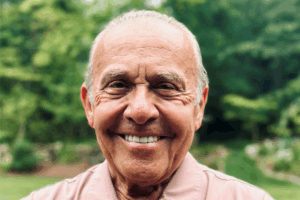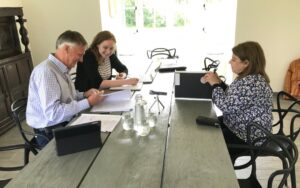tThe English Midlands county of Nottinghamshire makes only infrequent appearances on the library shelves at LifeBook Memoirs, so it was a real and personal pleasure for me to edit Margot Griffiths’ book, I Once Was a Rose, which recounts a life spent in a Nottinghamshire village only a few miles from my own home. Many of the fields, rural lanes, and city streets Margot travels in her story are familiar to me, but some disappeared many years ago—built upon, moved, or altered beyond recognition—and now exist only in history, maybe even only in the pages of Margot’s book. Learning of what had existed where new housing estates and warehouses now stand was enthralling.
Painting life with a fine brush
Like Jane Austen, Margot paints her world with “a fine brush.” She describes—in loving, warm, and often comic detail—her early childhood in Nottingham, the rural Nottinghamshire landscape where she has spent most of her life, her fifty-year marriage to her beloved husband, Alan, her three sons’ lives, the companionship she has found in her later years with her partner, Ron, and the many animals who have colored her days. With tales of being served a plate of earthworms by the little boy next door when she was five, escapades with naughty Tommy the pony and Donna the Great Dane, and bike rides to work with Alan, she entices her readers into a rich and finely drawn story.
Margot’s story begins in Nottingham before the start of World War II. She was, she says, a tomboy, wryly observing that this was what happened to a girl blessed with three brothers.
“If I didn’t join in with them,” she says, “I’d had it.”
A beautiful doll’s house complete with furniture, for example, she filled with white mice.
“Wonderfully,” she says, “I could watch them climbing over the furniture through all the windows.”
There were, however, soon so many mice babies that her family insisted something had to be done. One by one, unbeknown to Margot’s teachers, the mice—little fluffy contraband bundles in shoe boxes—were taken to school and distributed among her friends.
Margot’s childhood was not a cosseted one. Upon hearing tales of her latest explorations of the Nottinghamshire countryside, her mother was wont to say, “Well, as long as you’re not falling in any ponds or anything …” Margot also had many adventures with her beloved pony, Tommy, including riding on the beaches of the Lincolnshire coast, inviting boys from the nearby juvenile detention center to a family Bonfire Night party without thinking to ask her parents first, and an enjoyably farcical episode in which she and Tommy were abandoned on a railway siding in a horsebox.
Animals—horses, dogs, cats, hens, bees—continued to play a rich part in Margot’s life as she grew into adulthood. As well as running boarding kennels, she worked as a laboratory assistant in veterinary research, where some of her daily duties in the parasitology department are not suitable for repeating here.
Loving, laughing, and living
Margot and Alan were, she says, chalk and cheese, but their long marriage was the happiest imaginable. They met when Alan, a biologist, started working in the same virology department as Margot, and love quietly and steadily blossomed between them. They married and took their honeymoon in the family caravan on the Lincolnshire coast, accompanied by Margot’s Great Dane, Donna. The presence of such a large dog in a caravan ensured that romance was perhaps less romantic than Margot and Alan might have hoped.
Three sons and many years of happiness followed in the small Nottinghamshire village where Margot has lived since she was ten years old. Her home is a place of “treasured memories” and “shared fulfilment, love, hard work, and even sadness,” all of which she describes with detailed affection. She and Alan were deeply immersed in activities in the village, enjoying dances at the village hall, the bowls club, the local horticultural show, the Parish Council, and lots of fetes and festivals. As her sons, of whom she is immensely proud, grew up, Margot took on a variety of roles, including psychiatric nursing, running a playgroup and a Brownie pack in the village, and, in later years, caring for her elderly mother and a frail family friend in her home.
Margot’s story, by turns funny and touching, is modest and unassuming. Perhaps more than this, though, it is the story of how kindness and love bring happiness and contentment. As she brings her autobiography to a close, she wishes, on reflection, that she had taken more care to avert some of her many riding injuries, but other than that, she has no regrets. She would not change a thing.

Written by Kate Parry, LifeBook Memoirs editor




